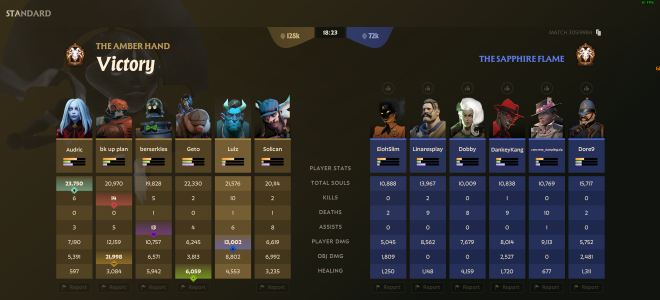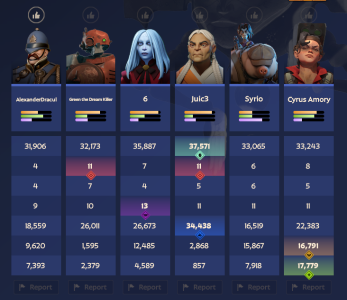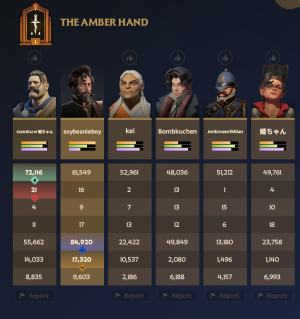Install the app
How to install the app on iOS
Follow along with the video below to see how to install our site as a web app on your home screen.
Note: This feature may not be available in some browsers.
You are using an out of date browser. It may not display this or other websites correctly.
You should upgrade or use an alternative browser.
You should upgrade or use an alternative browser.
Bad Matchmaking Thread
- Thread starter Yoshi
- Start date
yeah its time to stop playing deadlockDunno why I even bother posting these anymore, its not like anything changes. Dunno why i play anymore. Its just frustrating. 900 hours and this is what I get. 23 min game where I have the same kills as my whole team. Sad man, honestly
View attachment 32898
sanderman012
New member
enemy team won in under 20min, 30490979.
MinTillMassacre
New member
Match ID: 30506921
If I'm going to be matched with new players at Ritualist, I'm just out entirely. I can never progress or get better if I'm getting dunked on cause I'm on a team of newer players.
If I'm going to be matched with new players at Ritualist, I'm just out entirely. I can never progress or get better if I'm getting dunked on cause I'm on a team of newer players.
dash_javen
New member
30507672
30506774
I faced off 2 identical opponents in 2 games, and one of them was clearly a smurf who has extremely good tracking, and had been oppressive in both games. How is this acceptable? As if being put against them for 1 game isn't enough, the matchmaker had to put me through 2 games against them consecutively? Why not place them into games with the smurf teams instead of games that are meant to be similarly skilled?
30506774
I faced off 2 identical opponents in 2 games, and one of them was clearly a smurf who has extremely good tracking, and had been oppressive in both games. How is this acceptable? As if being put against them for 1 game isn't enough, the matchmaker had to put me through 2 games against them consecutively? Why not place them into games with the smurf teams instead of games that are meant to be similarly skilled?
Fergus Bentley
Active member
30512667
At this point it's just masochism to queue up... I don't know why I'm doing it anymore. I mean it's because there are no other good multiplayer games right now but still
At this point it's just masochism to queue up... I don't know why I'm doing it anymore. I mean it's because there are no other good multiplayer games right now but still
soybeanieboy234
New member
Lulz
Active member
Match ID: 30519984
I had been on vacation for about 2 weeks. Just got back, feeling super rusty. Flubbing all the tech I used to use. Don't think I successfully used a heavy melee cancel that entire match despite it being a mainstay for my playstyle.
I alone had 3 times the kills of the whole enemy team combined. My team had 13x times the enemy's....

I had been on vacation for about 2 weeks. Just got back, feeling super rusty. Flubbing all the tech I used to use. Don't think I successfully used a heavy melee cancel that entire match despite it being a mainstay for my playstyle.
I alone had 3 times the kills of the whole enemy team combined. My team had 13x times the enemy's....

The Master Mind
Member
Match ID: 30445611
Bebop (first match) and Viscous (1s match) where against a seven (660+ matches)
Dynamo (4th match) against McGinnis (220+ matches) and vindicta (125+ matches)
Bebop (first match) and Viscous (1s match) where against a seven (660+ matches)
Dynamo (4th match) against McGinnis (220+ matches) and vindicta (125+ matches)
30528189 Approximately 20k soul deficit 10 minutes in, game ended in 21st minute with a 40k soul difference. All lanes got completely overrun.
30533951 Ended in the 25th minute with approximately 50k soul difference. Even though this felt less 'stompy' than the other game, it also felt a lot less fun than other games in the past week.
30533951 Ended in the 25th minute with approximately 50k soul difference. Even though this felt less 'stompy' than the other game, it also felt a lot less fun than other games in the past week.
tracked my last game on tracklock and found out that 2 players in my team has only 1-2 game in there steam account. Why this is ranked game if you can play with my level (arcanist 3) with 0 or 1 game at all? So the ranking system put this 2 players for checkout what level they have? But why sholud i suffer from this horrible game? 2 players have 10 death and 0 kills? Last 2 weeks my level jumping from arcanist 1 to arcanist 3 with zero chance to run away from it. Im tired im out sorry
Similar threads
- Replies
- 0
- Views
- 147
- Replies
- 4
- Views
- 112
Share:
Members online
- rampagexx
- titanatora
- wanderdl
- illspectergum
- jurnieks1233
- Rashax98
- Akasha
- MariMaci
- turkeysdc
- orbitalsalttrooperx1
- savageacrocanthosaurus
- spidermanpal123
- big_kwii
- logmore
- pmkilcommons
- Loose_Noose
- BattleOozzee
- nathanieljbrill
- mattiapearl
- come219
- Redacted_000
- Sayuyu
- HyperLate
- v0latiles7n
- jpmisteri
- mateozunin
- gridsquare
- LashIsHot
- Marlboro Lights
- Lovely
- GregC
- Cyclespx
- sasha sano
- airdrain
- woonaprime
- akiyusanuse
- thatsthejoke.com
- Mikein
- Kakutsu
- jeneadiea
- phonghleplay
- germanwizard1
- bonniedrawsking
- Deoxoid
- Reddragonoid
- Gkh013
- gravitationification
- erikdk6
- AlexChinaskii
- pak215
Total: 8,757 (members: 151, guests: 8,606)



